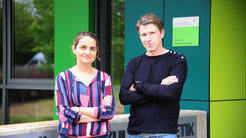Millions in funding for the “ImmunoPreCept” cluster of excellence
Alexander Meissner and Aydan Bulut-Karslioglu from Max Planck Institute for Molecular Genetics participate in a new cluster of excellence: ImmunoPreCept.

Starting in January 2026, the cluster will receive funding of up to €10 million from the German Research Foundation (DFG) over seven years. All researchers are working toward a common goal – to develop therapies that can intercept diseases on a molecular level.
Enabling molecular prevention
Most chronic inflammatory diseases develop over decades before becoming symptomatic. ImmunoPreCept, a consortium of systems medicine, clinical and experimental medicine, aims to focus on the pre-disease phase: Why do some people remain healthy, despite being exposed to the same factors that cause diseases in others? And how can diseases be detected early before they cause irreversible damage to the body? Unlike traditional medicine that treats diseases after they have developed, this approach offers the chance to intercept chronic inflammation or diseases such as cancer early on, or to prevent them by strengthening the body’s defenses. The goal is molecular prevention. Another focus of the researchers is understanding the remission phase – a pause after an illness, which despite successful therapy, is not the same as being cured.
Through their innovative research concept, the scientists at ImmunoPreCept are making an important contribution to promoting human health in the long term and relieving the burden on healthcare systems.
The Max Planck Institute for Molecular Genetics is joining the cluster led by Charité and the MDC. Other institutes participating in the Cluster of Excellence include the German Center for Rheumatology Research (DRFZ), Freie Universität Berlin (FU), Humboldt University of Berlin (HU), and the Museum of Natural History (MfN).
Background:
As part of the Excellence Strategy competition sponsored by the federal and state governments, five clusters in Berlin will each receive up to ten million euros in funding for seven years starting in January 2026. Partners of the Berlin University Alliance submitted proposals for three new clusters and the continuation seven existing projects. A committee of experts evaluated the proposals. Based on their recommendations, the Excellence Commission, consisting of the Committee of Experts and German federal and state ministers of science, announced the new and existing Clusters of Excellence that have been awarded funding on May 22, 2025.














